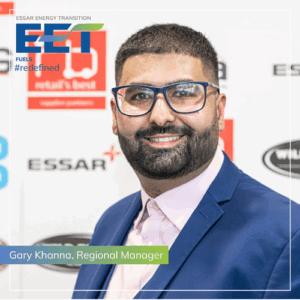At EET Fuels, we’re leading the energy transition by performing today, transforming for tomorrow, and delivering the UK’s first low carbon refinery.
Our people are vital to achieving our ambition, and #redefined showcases the work that they are doing to deliver the fuels our community needs, now and in the future.
This month, we spoke to Gary Khanna, a regional manager in our commercial team.

How would you describe your day-to-day role?
Working within the marketing department at Stanlow, I manage a wide portfolio of long-standing commercial transport customers and resellers nationally.
My primary responsibilities include the sale of UK land fuels including diesel, gas oil, kerosene and unleaded to industrial and commercial customers, which is delivered via our contracted hauliers – customers can also collect ‘ex-rack’ at the refinery and terminal locations. Typical market sectors include bus and coach, road haulage, in-house distribution fleets and rail. We deal with a wide variety of customers ranging from the larger household names down to small family-owned businesses, each bringing their own unique requirements.
I work closely with the EET Fuels’ marketing team, which includes supply, distribution and logistics team members, brought together to deliver the best experience possible for our all of our customers.
How has your role been redefined to support EET Fuels in reaching its target to reduce its carbon emissions by 95% by 2030?
I work in the front-line sales team, and I am therefore a face of the business to the wider market and industry. With the government’s ambition to reach net zero by 2030 firmly at the top of our clients’ lists, our goal is to support them by supplying them with the low carbon fuels they will need to become more sustainable and to help them understand our pan-UK strategy and ambition to produce fuels using low carbon processes.
To stay one step ahead, it’s important for me to understand current industry trends, as well as the timelines that are being put into place to support future ambitions. I can then pass this information on to my clients and act as a liaison or interface between them and the refinery, so we can support them in switching to solutions that help them to hit their all-important targets.
What does success look like in your role for 2024?
Success for me is in the growth of our pan-UK strategy, existing portfolio renewals, as well as in hitting new business targets in new regions.
As a team, how would you say you are contributing to the UK’s energy transition?
The way I look at it is that the front office is the sales team on the ground and the back office is the refinery itself. As a team, we are supporting the decarbonisation of refinery and the introduction of new products and tailored solutions, which are bespoke to our clients, so that they can achieve their net zero targets.
In addition, we are all actively involved in telling the story of the decarbonisation of the plant and the UK’s energy transition through education campaigns and engagement with the local community, through schools’ initiatives and building and maintaining local partnerships.
In your role, what do you think will be the key areas of focus or challenges in the next three years, and how do you plan to address them?
The next three years will be an exciting and challenging time for the energy sector as we press on towards 2030.
As always, it will be important to keep a watchful eye on trends in demand for the products produced at the refinery and the impact those trends will have.
Maintaining an understanding of the competitive and ever-changing market landscape will be key, as will keeping on top of regulatory changes and mandates, so that we can stay ahead of curve.
